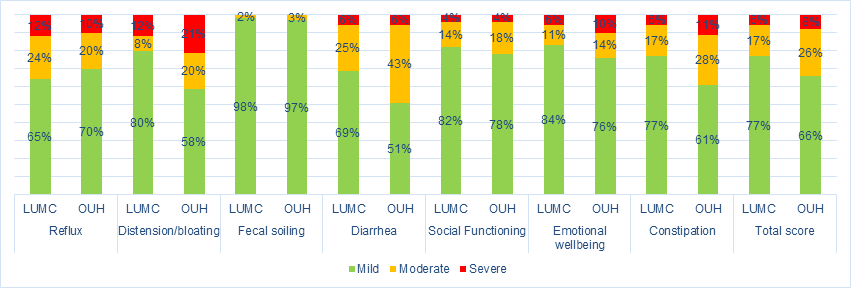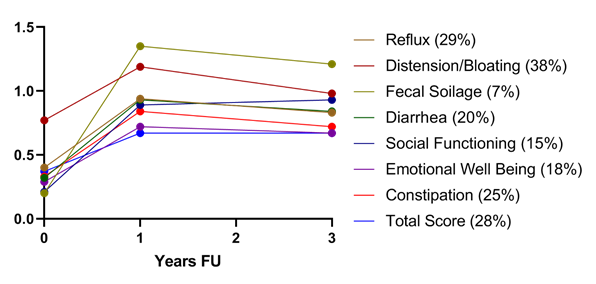Session Information
Session Type: Poster Session (Sunday)
Session Time: 9:00AM-11:00AM
Background/Purpose: In systemic sclerosis (SSc), the gastro-intestinal tract (GIT) is reported to be the most affected organ after the skin. GIT involvement is associated with high morbidity and mortality. Identifying patients with progressive GIT involvement could help tailor disease management and allow earlier access to appropriate treatments for patients at risk; as well as facilitate inclusion of patients in clinical trials. The aim of this study was to evaluate the severity and evolution over time of GIT involvement in SSc patients measured by the UCLA GIT 2.0 questionnaire (UCLA GIT score) and assess predictive factors for progression of GIT involvement in two large and independent SSc cohorts.
Methods: All SSc patients fulfilling the American College of Rheumatology (ACR 2013) criteria followed at the Leiden University Medical Centre (LUMC) or Oslo University Hospital (OUH) between 2013-2018 were included. Clinical and demographic features were collected and GIT involvement assessed by the UCLA GIT score at baseline and annually up to 5 years. Progression of GIT involvement was determined for total GIT and each subdomain using the minimal clinical important difference (MCID, Khanna et al. 2011). Univariable and multivariable logistic regression were used to identify baseline variables associated with baseline GIT involvement. Linear mixed-effect regression analysis models were used to assess changes in UCLA GIT scores over time, to control for repeated measurements and to identify predictive factors associated with any change in UCLA GIT score during the observation period.
Results: In total 834 SSc patients were included (LUMC n=456, OUH n=380), of these 536 (64%) had at least one year, and 270 (32%) had at least three year of follow-up. The majority was female (81%) and median disease duration since non-Raynaud was 4.1 years (Table 1). The severity of GIT involvement was similar in both cohorts with 6% (LUMC) and 8% (OUH) patients with severe GIT involvement (Figure 1). Disease duration since onset non-Raynaud (OR 1.03 CI 1.01-1.06), smoking (OR 2.30 CI 1.1-5.0) and anti-centromere antibody (ACA; OR 1.84 CI 0.9-3.9)) were significantly associated with severity of GIT involvement at baseline. Evaluation of GIT progression during the first year showed progression for total GIT score in 28%, with clear variation between the subdomains (Figure 2). In the mixed-effect models, predictive factors for progression of GIT involvement over the observation period were time from onset non-Raynaud, female gender and ACA. Treatment with calcium channel blockers (CCB) was protective for severe GI involvement and for progression
Conclusion: These data from two large and independent SSc cohorts provide novel and important insights regarding the frequency, severity and course of GIT involvement in patients with SSc. We show that assessing GIT involvement using the UCLA GIT subdomains identifies more patients with relevant GIT progression than using the total score. ACA and female gender were identified as the strongest predictors for progression and interestingly CCB treatment was protective.
« Back to 2019 ACR/ARP Annual Meeting
ACR Meeting Abstracts - https://acrabstracts.org/abstract/severity-and-evolution-over-time-of-gastro-intestinal-involvement-in-patients-with-systemic-sclerosis-in-two-large-and-independent-cohorts/



